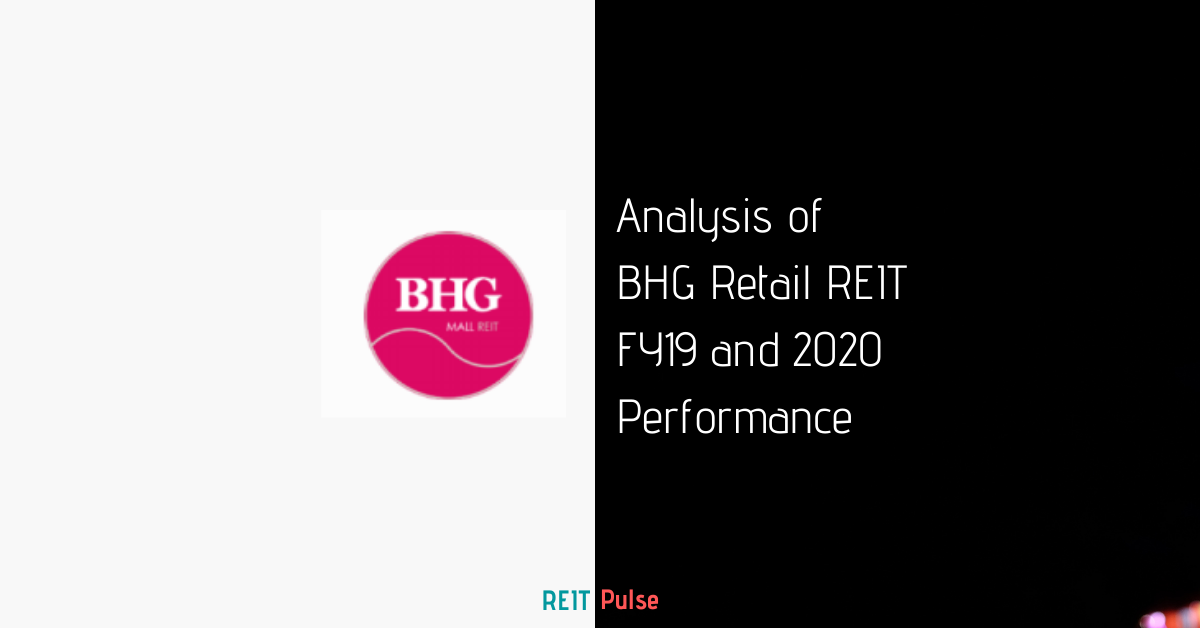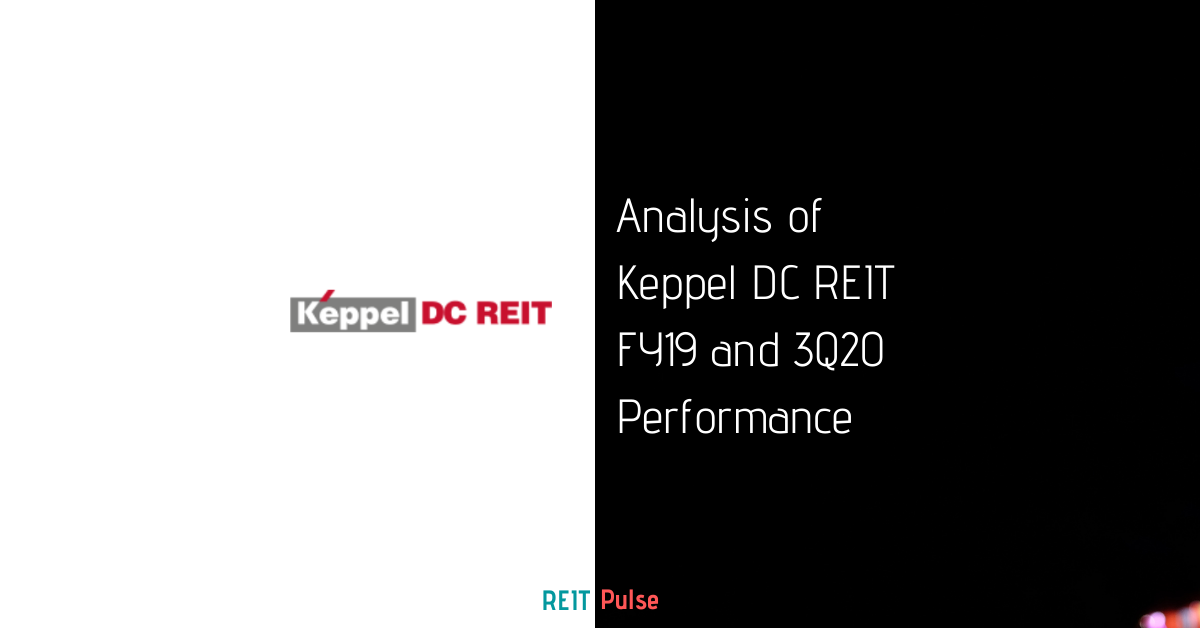
BHG Retail REIT is a Singapore listed REIT with assets presence across China. They are the first REIT which was listed in the Singapore exchange sponsored by an established PRC homegrown retail property operator, Beijing Hualian Department Store Co., Ltd.
In our last post, we have shared a post on CapitaLand Retail China Retail Trust where we have looked into how it has performed in both FY19 and 2020 given the COVID-19 pandemic outbreak. Given the similar geographical region of both CRCT and BHG Retail REIT assets, we have decided to look into BHG Retail assets performance as well.

For those who are new to BHG Retail REIT, they have a total of 6 assets across China of which 2 are master leased and the remaining 4 are multi-tenanted. Their total portfolio is valued at approximately SGD 929 million as at 30 June 2020.
Here are few key things you need to know of BHG Retail REIT FY19 and 2020 Performance.
Historical Performance (FY17 to FY19)
1. Decline in occupancy rate but still within a healthy range
| FY17 | FY18 | FY19 | |
| Beijing Wanliu | 100.0% | 100.0% | 96.2% |
| Chengdu Konggang | 96.8% | 97.0% | 94.7% |
| Hefei Mengchenglu | 100.0% | 96.2% | 95.1% |
| Hefei Changjiangxilu | n.a | n.a | 97.6% |
| Xining Huayuan | 100.0% | 100.0% | 100.0% |
| Dalian Jinsanjiao | 100.0% | 100.0% | 100.0% |
| Portfolio Average | 99.7% | 98.7% | 96.7% |
BHG Retail REIT overall portfolio occupancy rate has been declining from 99.7% in FY17 to 96.7% in FY19. The decline is mainly from the Beijing Wanliu, Chengdu Konggang and Hefei Mengchenglu properties.
An area investors should pay close attention to is the performance of Beijing Wanliu in which accounts for the biggest proportion of BHG Retail REIT properties composition. A huge decline in its occupancy rate could potentially be detrimental to the REIT overall financial performance. Nevertheless, BHG Retail REIT overall occupancy rate is still within a healthy range.
From another positive point of view, there has been another new addition of Hefei Changjiangxilu in April 2019 which will further diversify its overall composition. As the acquisition is made mid of the year, this would have an impact on the overall distribution per unit given that its full-year earnings have yet to kick in.
2. Increased in both revenue and net property income from FY17 to FY 19
| SGD in ‘000s | FY17 | FY18 | FY19 |
| Gross Revenue | 64,519 | 69,669 | 79,058 |
| Net Property Income | 42,944 | 45,647 | 50,476 |
The financial performance, on the other hand, has been stably increasing. Revenue has increased from SGD 64.5 million in FY17 to SGD 79.1 million in FY19 whereas net property income has increased from SGD 42.9 million in FY17 to SGD 50.5 million in FY19.
The increased is attributed to the positive rental reversion for new and renewed leases with the newly added Hefei Changjiangxilu being the key reason for the increased in revenue and NPI in FY19.
3. Year on year decline in distribution per unit (DPU)
| FY17 | FY18 | FY19 | |
| DPU (cents) | 5.47 | 5.16 | 3.87 |
Despite the improved financial performance from FY17 to FY19, the distribution per unit has been on a decline. The DPU has been dropping consistently from 5.47 cents in FY17 to 3.87 cents in FY19.
One reason for the drop is from the newly added Hefei Changjiangxilu properties. Given that the acquisition is made mid of the year, this would have an impact on the overall distribution per unit given that its full-year earnings have yet to kick in.
Investors who are keen in this REIT should definitely keep a close look at the DPU performance going forward. However, we would expect the DPU to remain low in the short to medium term given the COVID-19 outbreak.
4. Gearing of 35.7% within the permissible limit
As at 31 December 2019, the gearing of BHG Retail REIT is at 35.7% which is below the permissible limit of 50%. This would give them ample debt headroom for further acquisition and asset enhancement initiatives.
1H20 Performance
5. Occupancy rate continues to decline through 1Q20 to 3Q20
| Dec-19 | 1Q20 | 1H20 | 3Q20 | |
| Overall Occupancy | 96.70% | 94.70% | 92.90% | 91.50% |
The overall occupancy rate of BHG Retail REIT continues to decline from 96.7% in Dec-19 down to 91.5% in 3Q20. This could be due to the impact of COVID-19 in which China is the epicentre of the outbreak.
However, given the gradual recovery in China especially with the stronger economic recoveries in Q320, we would expect the operational performance to slowly pick up in the medium term.
6. Decline in net property income due to tenant rebates given

As shared in the previous few points, BHG Retail REIT has acquired Hefei Changjiangxilu in which we would expect a full-year rental reflected in FY20. This should translate to a stronger financial performance in 1H20. However, if we were to look at the 1H20 performance, the net property income in 1H20 has declined by 34.5% when compared to the 1H19 result.
The decline is mainly from the impact of COVID-19 in which a lockdown was imposed in China earlier this year. As a result, BHG Retail REIT has provided a rental rebate to eligible tenants amounting to close to 1.4 months of rent on average.
Summary
From REIT Pulse point of view, BHG Retail REIT has been performing fairly well historically from FY17 to FY19. The new addition of Hefei Changjiangxilu should be a great addition to the REIT overall portfolio.
Despite the expected growth, the 1H20 performance paints a different picture mainly due to tenant rebate given to tenants. Occupancy rate though within a healthy range have been declining since FY17.
Nevertheless, with China gradual recovery, this could potentially be a positive sign. Definitely, an area investors should keep an eye on.
What are your thoughts on BHG Retail REIT? If you are just getting started, feel free to read more of our REIT Guide and REIT Analysis. You can also read more about what REITs are if you are new to REITs.
Do join our community over at Facebook and Instagram.





